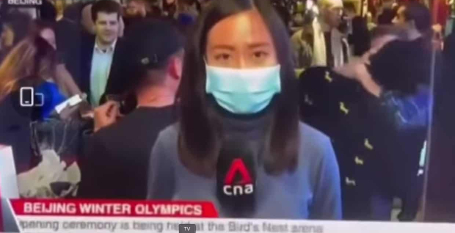It was a Singaporean news report on the Winter Olympics opening ceremony, live from a Beijing bar filled with eager fans. Yet it was two men – who burst into the view of the camera, sharing a dramatic kiss – who stole the show.
The clip has since gone viral in Singapore, where broadcasting codes restrict content that promotes LGBT “lifestyles”, and where sexual relationships between men are outlawed.
Allow TikTok content?
This article includes content provided by TikTok. We ask for your permission before anything is loaded, as they may be using cookies and other technologies. To view this content, click 'Allow and continue'.
Allow and continue
The kiss does not feature in a version of the report published by Channel News Asia (CNA) on its website. But on TikTok a clip of the kiss has been viewed more than 825,000 times. “This is actually an act of revolution,” one user wrote. It has also been shared widely on Weibo, a popular social media platform in China.
Advertisement
It is the look given by one of the men, who poses directly to camera post-kiss, that has caught many people’s attention, said a representative of Kaleidoscope NTU, a group formed by students at Nanyang Technological university to raise awareness of discrimination on the basis of sexual orientation, as well as gender, race and class.
“We don’t know who this guy is, of course, so we don’t know if he knew they were kissing for CNA specifically or just a camera in general. But the defiance of it, the joy that comes with being able to show off your partner and the confidence in getting to be yourself as well, the combination would have naturally spoken to a lot of queer people within the country as well,” they said.
China decriminalised same-sex relationships in 1997, but same-sex marriage is not legal there and the LGBTQ+ community continues to face discrimination and censorship.
Activists say the clip, and the reaction it has provoked, illustrates how outdated Singapore’s laws are. “Singapore is considered a developed country, but we are really backwards when it comes to LGBT rights,” said Jean Chong, a co-founder of Sayoni, an LGBT rights organisation.
Guidelines from Singapore’s Infocomm Media Development Authority for free-to-air and subscription television state that films that“depict alternative sexualities, eg, homosexuality, should be sensitive to community values”, and that films that promote homosexuality will be denied classification.
A content code for free-to-air radio services lists LGBT content alongside “paedophilia and incest”, stating that programmes referring to such “lifestyles” should be treated with utmost caution. “Their treatment should not in any way promote, justify or encourage such lifestyles,” it states.
Gus Kenworthy at the 2020 Dew Tour Copper Mountain in Colorado
Skier Gus Kenworthy: ‘My legacy in Pyeongchang was that kiss – to have it broadcast to the world felt amazing’
Read more
Speeches by high-profile figures have been censored under broadcasting rules, including Barack Obama’s 2016 appearance on the Ellen DeGeneres Show, in which he praised the host as a role model.
Benjamin Xue, a co-founder of the LGBT youth support group Young Out Here, said such censorship failed to control the media consumed by younger generations. Instead of tuning into free-to-air TV, young people were watching YouTube and online streaming services.
Attitudes among young people had changed significantly in the 15 years that Young Out Here has operated, he added. “They are coming out a lot younger these days and are a lot more sure about their identity – especially trans and non-binary young people,” Xue said.
Yet the gap between online media and local television, which is consumed by older generations, risked contributing to a growing divide in opinions. “Their parents, their grandparents and the rest of society are not viewing the same lens,” Xue said.
There's been plenty of queer highlights already from the Winter Olympics, but a live report from Channel News Asia has been one of the most unexpected delights so far.
A CNA reporter was fronting a live cross from a crowded bar in Beijing. As the reporter was speaking to camera, two men moved into shot and shared a passionate kiss.
In many countries, that wouldn't be a big deal, but Singapore's broadcasting codes prohibit content that presents LGBTQ people and relationships in a positive light.
Guidelines from Singapore’s Infocomm Media Development Authority for free-to-air and subscription television state that films that“depict alternative sexualities, eg, homosexuality, should be sensitive to community values”, and that films that promote homosexuality will be denied classification.
A content code for free-to-air radio services lists LGBT content alongside “paedophilia and incest”, stating that programmes referring to such “lifestyles” should be treated with utmost caution. “Their treatment should not in any way promote, justify or encourage such lifestyles,” it states.
While CNA hasn't rebroadcast the report or included it in any of its online coverage, the clip has made its way onto TikTok and is racking up the views.
The kiss is being widely celebrated by social media users, with many noting the kissing couple's look of defiance and joy when they realise that they got their kiss on camera.
The furore over the kiss highlights how out-of-step Singapore is on LGBTQ equality.












 列印版本
列印版本


















讀者回應
請先登入再使用此功能。